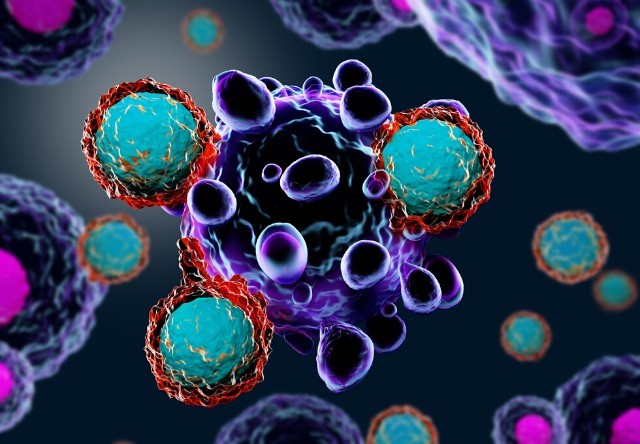
Different forms of immunotherapy may be given in different ways. These include:
- Intravenous (IV)
The immunotherapy goes directly into a vein. - Oral
The immunotherapy comes in pills or capsules that you swallow. - Topical
The immunotherapy comes in a cream that you rub onto your skin. This type of immunotherapy can be used for very early skin cancer. - Intravesical
The immunotherapy goes directly into the bladder.
Where do you go for immunotherapy?
You may receive immunotherapy in a doctor’s office, clinic, or outpatient unit in a hospital. Outpatient means you do not spend the night in the hospital.
How often do you receive immunotherapy?
How often and how long you receive immunotherapy depends on:
- Your type of cancer and how advanced it is
- The type of immunotherapy you get
- How your body reacts to treatment
You may have treatment every day, week, or month. Some types of immunotherapy given in cycles. A cycle is a period of treatment followed by a period of rest. The rest period gives your body a chance to recover, respond to the immunotherapy, and build new healthy cells.
How can you tell if immunotherapy is working?
You will see your doctor often. He or she will give you physical exams and ask you how you feel. You will have medical tests, such as blood tests and different types of scans. These tests will measure the size of your tumor and look for changes in your blood work.
What is the current research in immunotherapy?
Researchers are focusing on several major areas to improve immunotherapy, including:
- Finding solutions for resistance.
Researchers are testing combinations of immune checkpoint inhibitors and other types of immunotherapy, targeted therapy, and radiation therapy to overcome resistance to immunotherapy. - Finding ways to predict responses to immunotherapy.
Only a small portion of people who receive immunotherapy will respond to the treatment. Finding ways to predict which people will respond to treatment is a major area of research. - Learning more about how cancer cells evade or suppress immune responses against them.
A better understanding of how cancer cells get around the immune system could lead to the development of new drugs that block those processes. - How to reduce the side effects of treatment with immunotherapy.
How do you find clinical trials that are testing immunotherapy?
To find clinical research studies that involve immunotherapy visit Find NCI-Supported Clinical Trials or call the Cancer Information Service, NCI’s contact center, at 1-800-4-CANCER (1-800-422-6237).
NCI’s list of cancer clinical trials includes all NCI-supported clinical trials that are taking place across the United States and Canada, including the NIH Clinical Center in Bethesda, MD.
Dott. Dario Sannino
